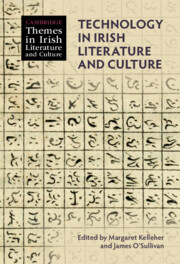Book contents
- Technology in Irish Literature and Culture
- Cambridge Themes in Irish Literature and Culture
- Technology in Irish Literature and Culture
- Copyright page
- Epigraph
- Contents
- Contributors
- Cambridge Themes in Irish Literature and Culture
- Acknowledgements
- Introduction
- Part I Genealogies
- Part II Infrastructures
- Part III Invention
- Part IV The Digital
- Chapter 14 Irish Literary Feminism and Its Digital Archive(s)
- Chapter 15 Consoling Machines in Contemporary Irish Fiction
- Chapter 16 ‘At Me Too Someone Is Looking’: Staging Surveillance in Irish Theatre
- Chapter 17 Technology in Contemporary Irish Poetry: Data at ‘the Edge of Language’
- Chapter 18 Irish Digital Literature
- Index
- References
Chapter 14 - Irish Literary Feminism and Its Digital Archive(s)
from Part IV - The Digital
Published online by Cambridge University Press: 19 January 2023
- Technology in Irish Literature and Culture
- Cambridge Themes in Irish Literature and Culture
- Technology in Irish Literature and Culture
- Copyright page
- Epigraph
- Contents
- Contributors
- Cambridge Themes in Irish Literature and Culture
- Acknowledgements
- Introduction
- Part I Genealogies
- Part II Infrastructures
- Part III Invention
- Part IV The Digital
- Chapter 14 Irish Literary Feminism and Its Digital Archive(s)
- Chapter 15 Consoling Machines in Contemporary Irish Fiction
- Chapter 16 ‘At Me Too Someone Is Looking’: Staging Surveillance in Irish Theatre
- Chapter 17 Technology in Contemporary Irish Poetry: Data at ‘the Edge of Language’
- Chapter 18 Irish Digital Literature
- Index
- References
Summary
Feminist literary retrieval projects in Ireland quickly embraced the bibliographical and hypertextual possibilities offered in the early 2000s by the then burgeoning field of digital humanities. This essay examines the printed prehistory of projects such as the Women in Modern Irish Culture Database and the Field Day Anthology of Irish Writing (volumes IV and V), demonstrating how this genealogy has shaped the nature and impact of the online archive. The chapter argue that the continuing absence from university syllabi, and publishers’ lists, of many of the Irish women ‘discovered’ by digital research projects, indicates that presence is only the first step in securing real engagement with the literary archive of women’s writings. Looking to the future of the feminist digital, and the potential offered by big data, this chapter explores how long-standing digital questions of access, interoperability, and sustainability continue to influence the parameters of the field.
Keywords
- Type
- Chapter
- Information
- Technology in Irish Literature and Culture , pp. 235 - 252Publisher: Cambridge University PressPrint publication year: 2023
References
Select Bibliography
- 1
- Cited by



